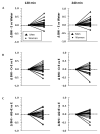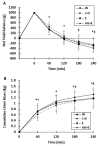The Beverage Hydration Index: Influence of Electrolytes, Carbohydrate and Protein
- PMID: 34578811
- PMCID: PMC8465972
- DOI: 10.3390/nu13092933
The Beverage Hydration Index: Influence of Electrolytes, Carbohydrate and Protein
Abstract
The beverage hydration index (BHI) facilitates a comparison of relative hydration properties of beverages using water as the standard. The additive effects of electrolytes, carbohydrate, and protein on rehydration were assessed using BHI. Nineteen healthy young adults completed four test sessions in randomized order: deionized water (W), electrolytes only (E), carbohydrate-electrolytes (C + E), and 2 g/L dipeptide (alanyl-glutamine)-electrolytes (AG + E). One liter of beverage was consumed, after which urine and body mass were obtained every 60 min through 240 min. Compared to W, BHI was higher (p = 0.007) for C + E (1.15 ± 0.17) after 120 min and for AG + E (p = 0.021) at 240 min (1.15 ± 0.20). BHI did not differ (p > 0.05) among E, C + E, or AG + E; however, E contributed the greatest absolute net effect (>12%) on BHI relative to W. Net fluid balance was lower for W (p = 0.048) compared to C + E and AG + E after 120 min. AG + E and E elicited higher (p < 0.001) overall urine osmolality vs. W. W also elicited greater reports of stomach bloating (p = 0.02) compared to AG + E and C + E. The addition of electrolytes alone (in the range of sports drinks) did not consistently improve BHI versus water; however, the combination with carbohydrate or dipeptides increased fluid retention, although this occurred earlier for the sports drink than the dipeptide beverage. Electrolyte content appears to make the largest contribution in hydration properties of beverages for young adults when consumed at rest.
Keywords: dipeptide; fluid balance; osmolality; potassium; sodium; sports drink.
Conflict of interest statement
No author declares a conflict of interest related to this work. The sponsor had no role in the execution of the study, or in the interpretation of the data. Millard-Stafford has served as a consultant for The Coca-Cola Company by delivering internal seminars.
Figures






References
-
- Institute of Medicine . Dietary Reference Intakes for Water, Potassium, Sodium, Chloride, and Sulfate. The National Academies Press; Washington, DC, USA: 2005. p. 638.
Publication types
MeSH terms
Substances
Grants and funding
LinkOut - more resources
Full Text Sources
Other Literature Sources
Medical

